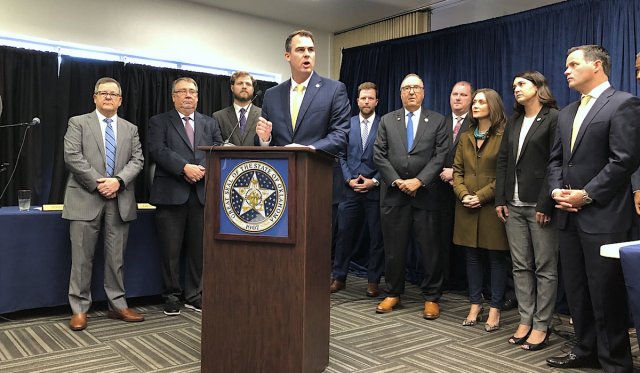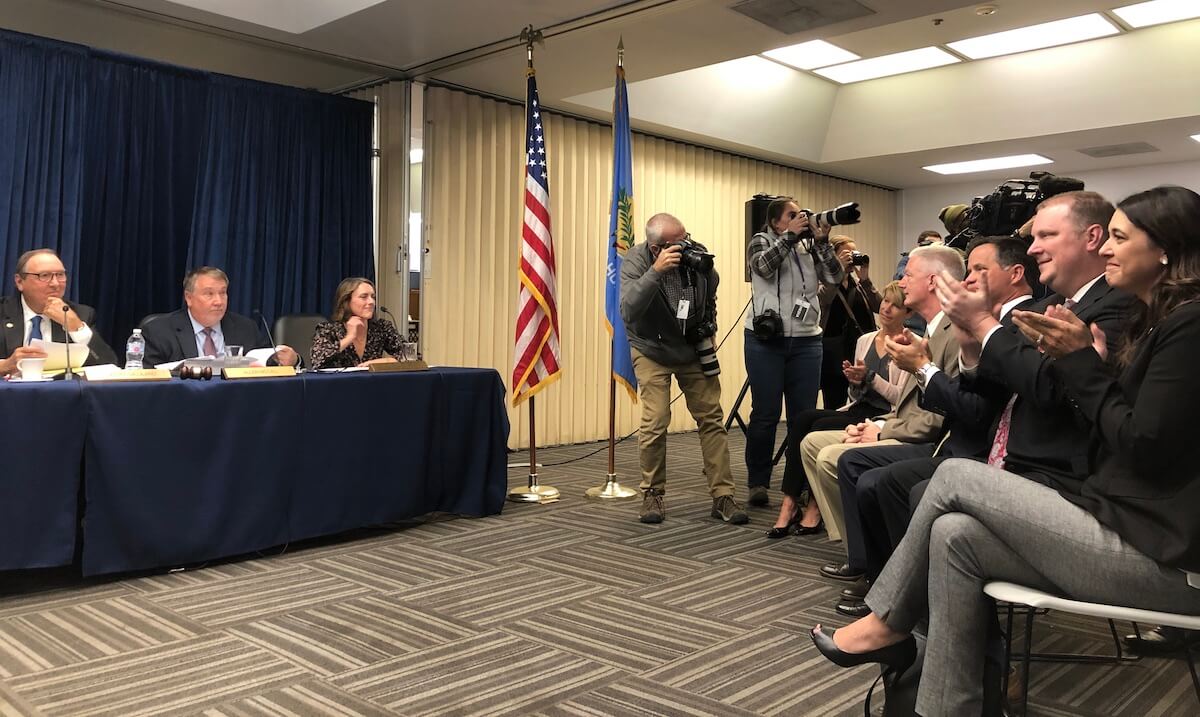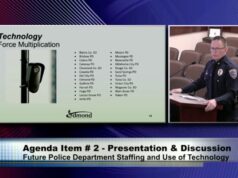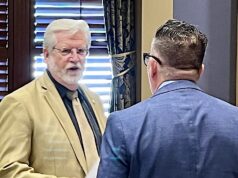

What is believed to be the largest single prison sentence commutation in U.S. history took its penultimate step forward today as the Oklahoma Pardon and Parole Board voted to send 527 names to Gov. Kevin Stitt for approval.
Stitt said he intends to sign the sentence commutations this afternoon, meaning individuals who have already served one year for drug and property theft crimes now considered misdemeanors will be released as early as Monday. Board staff said 462 people will be eligible for such release, totaling about 1,690 years of sentences being commuted.
“It’s truly an honor to be here on this historic day as we take an important step toward criminal justice reform in our state,” Stitt said after Friday’s board meeting. “Today we are implementing the will of the people. I truly believe that.”
Before Stitt’s remarks, Pardon and Parole Board staff attorney Justin Wolf spent nine minutes reading all 472 names approved from the drug possession docket to a packed room at the Kate Bernard Community Correctional Center. He also read the names of 55 people advanced for commutation on the property crimes docket.
The moment left board members, family members, criminal justice reform advocates and state lawmakers somber.
“It was humbling,” said House Majority Floor Leader Jon Echols (R-OKC). “These are real people with real lives and real families and real friends, and now they get to go home.”
Echols, Rep. Jason Dunnington (D-OKC) and Sen. Stephanie Bice (R-OKC) authored HB 1269, which applied sentencing changes retroactively and spurred the slate of commutations.
“I think hearing those names just confirms the need for criminal justice reform in Oklahoma,” Bice said. “This put real people behind bills that we as legislators put forward every day.”
The board did vote to remove 359 individuals from consideration for the advanced single-stage commutation recommendation. Those inmates will be able to apply for the board’s typical two-stage commutation process.
In 2016, Oklahoma voters approved State Question 780, which changed the categorization of those crimes. This spring, state lawmakers approved making the change retroactive toward those already incarcerated for only those crimes.
The ACLU of Oklahoma supported SQ 780, and after Friday’s meeting executive director Ryan Kiesel said more Oklahomans should ultimately be released from prison.
“We are pleased with today’s outcome,” Kiesel said. “But as historic as today is, there are still hundreds of individuals who will remain incarcerated who, if they were convicted today, would not have to step a foot inside a prison wall.”
‘Vital examples of criminal justice reform in our state’

Pardon and Parole Board Chairman Bob Gilliland opened the meeting by reiterating — twice — that those eligible for sentence commutation were convicted of non-violent offenses.
“We wish all the inmates who have achieved their freedom to join their families and friends to be vital members of their communities,” Gilliland said. “We hope and pray they will be vital examples of criminal justice reform in our state.”
He thanked board staff and leaders of the Department of Corrections for being thorough in their consideration of commutation eligibility, as well as their efforts to connect those about to leave prison with support services.
Pardon and Parole Board director Steve Bickley noted that DOC held 28 transition fairs to help connect those being released with resources.
“It was a moving experience to watch the emotion on the faces of the inmates as nonprofit after nonprofit stood up to tell how they were there to help with housing, counseling, employment, transportation,” Bickley said.
Stitt said during his press conference that his administration — in particular First Lady Sarah Stitt — will be continuing to support re-entry for those released from prison.
“This group of nonviolent offenders are just a part of this story,” Stitt said. “By the end of this year, we are anticipating we will have about 2,000 empty beds in our system.”
The Oklahoma Department of Corrections posts a weekly inmate count on its website. In the Oct. 28 data, 25,770 people were listed incarcerated inmates, down from 27,194 from Nov. 5, 2018. That difference of 1,424 individuals represents a 5.2 percent decrease.
Similarly, this year’s most recent data shows 31,904 under community supervision, while the Nov. 5 data from a year ago lists 33,292, a decrease of 1,388 people (or 4.1 percent).
(Correction: This story was updated at 4:30 p.m. Friday, Nov. 1, to correct Echols’ title. NonDoc regrets the error.)




















